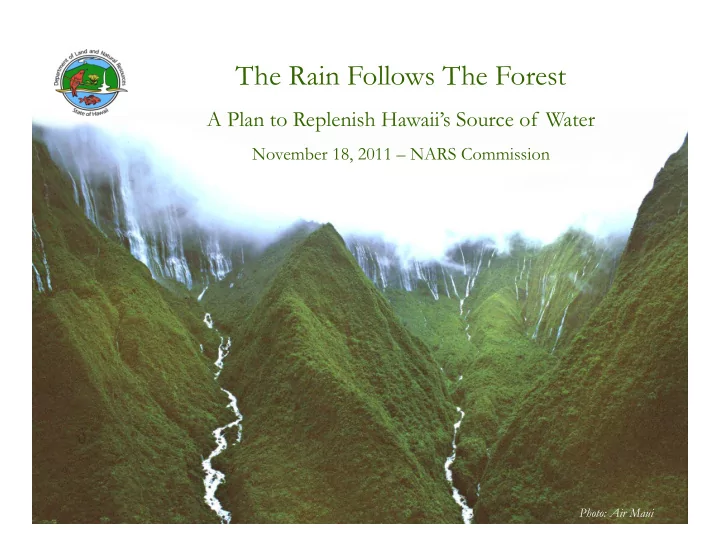

The Rain Follows The Forest A Plan to Replenish Hawaii’s Source of Water November 18, 2011 – NARS Commission Photo: Air Maui
The Rain Follows the Forest • Hawaii’s water supply is at risk • Benefits of forest watershed protection • Action plan • Funding and public support
Hawaii’s Water Supply is at Risk Evidence of Long-term Decline in Rainfall Chu, P.-S., and Chen, H. 2005. Interannual and interdecadal rainfall variations in the Hawaiian Islands. Journal of Climate 18: 4796-4813.
Hawaii’s Water Supply is at Risk Hawaii Temperature Giambelluca, T.W., Diaz, H.F., and Luke, M.S.A. 2008. Secular temperature changes in Hawai ‘ i. Geophysical Research Letters 35, L12702, doi:10.1029/2008GL034377.
Hawaii’s Water Supply is at Risk U.S. Drought Monitor
Hawaii’s Water Supply is at Risk Stream Base Flow in Decline Oki, D.S., 2004, Trends in Streamflow Characteristics in Hawaii, 1913-2003: U.S. Geological Survey Fact Sheet 2004-3104, 4 p.
Hawaii’s Water Supply is at Risk
Benefits of Forest Watershed Protection • Forests capture rain and cloudwater – Forests can increase water capture by up to 30% • 1% loss of recharge in the Ko`olau Mtns costs $42 million • Invasive plants reduce estimated groundwater recharge in East Hawaii by 85 million gallons/day • Desalination plant planned for `Ewa will cost $40 million to construct and $5 million annually to produce 5 million gallons/day
Benefits of Forest Watershed Protection Kohala Hualalai Kilauea Carbon density Watershed Priority Areas Asner, G. P., R. F. Hughes, J. Mascaro, A. L. Uowolo, D. E. Knapp, J. Jacobson, T. Kennedy-Bowdoin, and J. K. Clark. 2011. High-resolution carbon mapping on the million-hectare island of Hawai‘i. Frontiers in Ecology and the Environment 9:434-439
Benefits of Forest Watershed Protection
Action Plan • Remove all invasive hooved animals from priority I and II areas.
Action Plan • Remove or contain damaging invasive weeds that threaten priority I and II areas -Weed control in fenced areas -Control and prevention of new invasive species that will spread to priority I and II areas -Use and development of tested integrated pest management
Action Plan • Monitor and control other forest threats including fires, predators, and plant diseases. • Restore native species. • Establish benchmarks and monitor success. • Educate Hawaii’s residents and visitors about the cultural, economic, and environmental importance of conserving native forests. • Promote consistent and informed land use decision- making that protects watersheds.
Action Plan • DLNR’s Goal – Double acreage protected in next 10 years – Requires investment of approximately $11 million per year – Fund approximately 150 FTE natural resource careers – This level of effort, or more, needed in perpetuity to stabilize Hawaii’s water source
Action Plan
Action Plan
Methodology Managed Unmanaged Evapotranspiration Runoff/Erosion
Methodology Managed Unmanaged $ ? $ ?
Funding • Dedicated funding needed • Watershed protection benefits multiple sectors so identify many funding sources • Funding from uses that depend on or are mitigated by watershed protection - Visitor industries - Water - Climate change resiliency - Greenhouse gas emissions reduction
Polling Public Support Strongly support 10 8 6 4 2 Not support at all Not support at all 0 Urgency to protect Increase funding from $1 sources of fresh water to $11 million
Public Support Watershed Contributions Average Theme Capture rainfall and replenish fresh water supplies for our 9.2/10 Water use Provide water for local agriculture 8.9/10 Water/Economy Prevent erosion and runoff of sediment into our oceans 8.7/10 Oceans/Climate Change Are of spiritual & cultural importance to native Hawaiian 8.1/10 Culture culture Increase resistance to climate change by absorbing 8.0/10 Climate Change greenhouse gases Support the visitor industry by providing the unique 7.9/10 Aesthetic/Economy natural beauty that attracts tourists
Public Support Watershed Protection Average Theme Hawaii’s forests are important to Hawaii’s fresh water supply 9.5/10 Water Forests need protection because they are declining and 9.0/10 Native Species home to native plants and wildlife found nowhere else on earth Invasive species must be kept to a minimum to protect the 8.9/10 Invasive Species health of watershed forests Spending now to protect our forests saves taxpayer money 8.2/10 Economy in the long run
MAHALO Hahai no ka ua i ka ulula`au The rain always follows the forest Hawaii.gov/dlnr
Recommend
More recommend